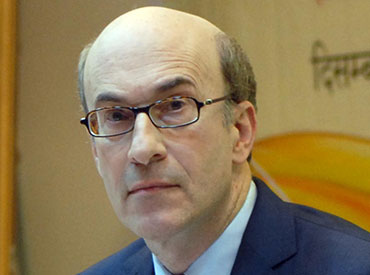[ad_1]
With US President-elect Joe Biden’s incoming administration promising a fresh, rational approach to climate change, now is an ideal time to make the case for a World Carbon Bank that would transfer and coordinate aid and technical assistance to help developing countries decarbonise. The proposed Green New Deal in the United States and the European Commission’s European Green Deal have laudable environmental goals but are too inward-looking.
According to the International Energy Agency (IEA), almost all the net growth in carbon dioxide emissions over the next two decades will come from emerging markets. Although China recently pledged to achieve zero net emissions by 2060, it is sobering to consider that it accounts for half of the world’s coal output and half of its coal consumption.
India, too, is highly dependent on its plentiful coal reserves, and will likely remain so despite strong advances in solar power. For all the fanfare accompanying the 2015 Paris climate agreement, the share of clean energy in global energy investment is still only around 34 per cent, almost exactly the level five years ago. Wind and solar account for only 8 per cent of global energy. The IEA estimates that allowing existing power plants to operate for the remainder of their expected lifespans in their current form would by itself cause global temperatures to rise by 1.7 degrees Celsius relative to pre-industrial levels.
Right now, the most widely discussed approach to encouraging developing economies to cut their CO2 emissions is a carbon border tax on imports from countries without adequate carbon-pricing systems. The European Union is currently considering such a measure, and the Climate Leadership Council also has advocated it.
Economists almost universally favour carbon taxes so that producers and consumers take account of how their actions affect the global commons. A border-tax adjustment is aimed at prodding developing economies to introduce their own carbon taxes. The policy is conceptually sound, but is too static and difficult to implement. For starters, developing economies have neither the resources nor the technology to transform themselves overnight. Part of the reason advanced economies have been able to mitigate their CO2 emissions is that global manufacturing has migrated to emerging markets that have invested heavily in energy.
The average age of coal plants in Asia is 12 years, compared to 43 years in advanced economies. Given that the lifespan of a coal plant is about 50 years, and coal is one of the few natural resources that China and India possess in abundance, the cost to developing Asia of decommissioning its coal plants is huge.
The gap between the developing world’s ability to deal with climate change and the ambitious plans being discussed in advanced economies is just another example of the huge disparity in wealth and resources between the Global North and the Global South. In response to the Covid-19 crisis, for example, advanced economies marshalled fiscal and credit support in 2020 averaging over 16 per cent of GDP, compared to 6 per cent in emerging markets and 2 per cent in developing economies, according to the International Monetary Fund (IMF). And this wide gap does not take into account the potential for pandemic-related debt build-ups to morph into a full-blown developing-country debt crisis over the next couple of years, making decarbonisation even more difficult.
Global carbon pricing is an essential part of any long-term solution to the climate crisis, but advanced economies need to provide the developing world with a carrot and not just a stick. This should come in the form of highly concessional financing, combined with technical expertise and sharing of best practices — all guided by a World Carbon Bank. The IMF, the World Bank, and regional development banks have an important role to play, but their mandates are too diffuse for them to deal effectively with the climate challenge on their own.
Is it too optimistic to think that inwardly focused advanced economies will ever be willing to earmark large amounts of aid — at least $100-200 billion per year — to help the developing world meet climate goals? The response to the Covid-19 crisis so far offers little encouragement; the G20’s Debt Service Suspension Initiative has delivered a few billion dollars of relief to 40 very poor countries, but that pales in comparison to the trillions that rich countries have spent on their own citizens. An enhanced carbon tax or pricing regime could be one source of sustainable funding over the longer term, but the problem is too urgent to wait for this to fall into place.
The goal of achieving zero net CO2 emissions by 2050, which the EU has adopted and the US is likely to do soon, is praiseworthy. But not-in-my-backyard, or NIMBY, environmentalism is no way to solve a global problem.
© Project Syndicate 2021
 Dear Reader,
Dear Reader,
Business Standard has always strived hard to provide up-to-date information and commentary on developments that are of interest to you and have wider political and economic implications for the country and the world. Your encouragement and constant feedback on how to improve our offering have only made our resolve and commitment to these ideals stronger. Even during these difficult times arising out of Covid-19, we continue to remain committed to keeping you informed and updated with credible news, authoritative views and incisive commentary on topical issues of relevance.
We, however, have a request.
As we battle the economic impact of the pandemic, we need your support even more, so that we can continue to offer you more quality content. Our subscription model has seen an encouraging response from many of you, who have subscribed to our online content. More subscription to our online content can only help us achieve the goals of offering you even better and more relevant content. We believe in free, fair and credible journalism. Your support through more subscriptions can help us practise the journalism to which we are committed.
Support quality journalism and subscribe to Business Standard.
Digital Editor
[ad_2]
Source link











